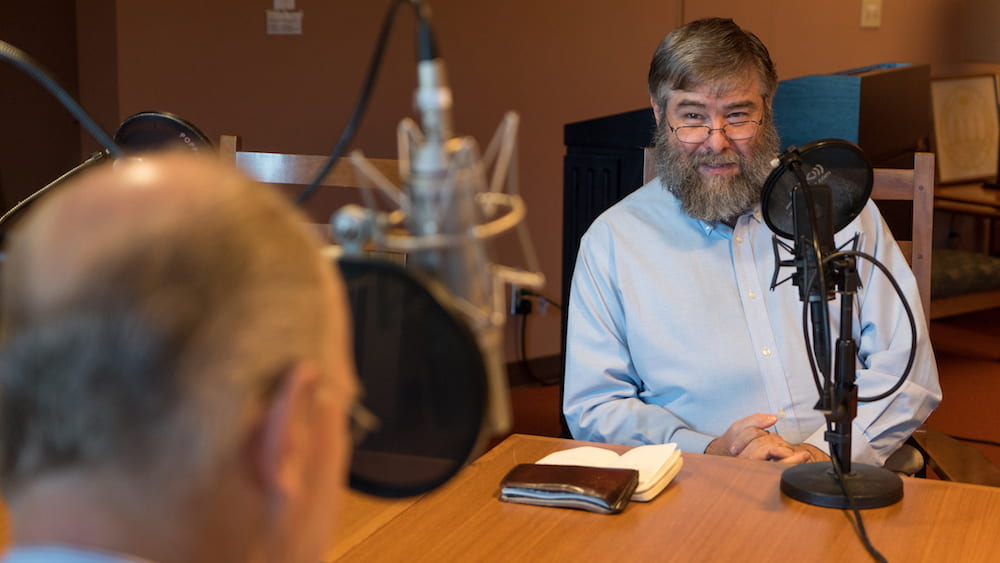BY COLLEEN COYLE – STAFF WRITER
Podcasts have exploded in popularity over the past five years, as news organizations rapidly adapt to the market by developing their own news podcasts. Centre is the most recent intellectual source to join this new venture in news media and idea sharing, with its very own CentrePoint Podcast. Dr. Beau Weston was instrumental in starting the podcast on campus and brought Bill Goodman in to host it. The podcast is divided into eight segments, two of which have been released already. Covering a range of topics, the podcast offers a glimpse into the academic life at Centre College as professors such as Dr. Benjamin Knoll, Dr. Lori Hartmann-Mahmud, Dr. Dina Badie, Dr. Beau Weston and Dr. Tony Haigh discuss relevant issues to today’s society. Topics include the current election season, international affairs, culture wars, and race/religion conflicts.
Dr. Beau Weston was instrumental in developing the podcast, seeking to expand the range of Centre’s academic sphere. According to Dr. Weston, the podcast format offers something that video cannot; “I think a video is hard to sell if all you see are talking heads. Audio, on the other hand, is well adapted to listen to while doing other things. Every format has its pros and cons, but I think podcasts are the most portable way to spread general knowledge with a little depth.” This project offers a pragmatic way for people outside of Centre’s campus that are connected to the college to access what happens here every day. The podcast has potential to create a network that builds the Danville community as they get to know professors through these broadcasts and to extend beyond city borders to areas Centre may not have otherwise been able to impact.
The first episode of the podcast sounds and feels like an episode of NPR, opening with a cheery piano sequence. Bill Goodman, of Kentucky Educational Television and Kentucky Tonight, starts the show off, and the whole episode flows seamlessly. Goodman effortlessly facilitates the conversations of Dr. Knoll and Dr. Stroup as they discuss the difficulties of analyzing this contentious election season in the classroom. Dr. Stroup focuses on the historical implications of the election, both how it might shape the future of the country and how it’s been shaped by our past. The conversation, with Goodman’s occasional interjection to ask questions, feels like something that might be overheard in the hallways of Crounse. If the first episode is any indication, the show will undoubtedly share one of the most beloved aspects of Centre’s culture: intellectual discourse that seeks to open the mind.
I spoke with Dr. Knoll about his experience participating in the fledging podcast. Dr. Knoll indicated that he enjoyed being part of an experiment stating “it was fun to do because it takes advantage of something we are already discussing in class.” Dr. Knoll reflected favorably on his opportunity to work with the host, Bill Goodman, sharing that “Bill had a very professional style that framed things well for discussion and made it easy to comment on topics.” Additionally, when asked about how he felt about the emergence of podcasts Dr. Knoll shared, “I personally really like podcasting as a format to disseminate information because I’m often doing stuff, cleaning up after my kids, or doing the laundry because it’s easy to listen while doing other things … I have learned a lot in my life just by listening to podcasts.” His experience in the podcast appears to be a beneficial one and will hopefully not be an isolated event.
Despite the fact that various professors on campus have experience with podcasts, CentrePoint is the first one to draw directly from the academic and intellectual minds on campus. The podcasts synthesize the atmosphere of Centre by sharing the personalities, thoughts, and humor of the professors simply by recording their conversation. Podcasts are a unique and pragmatic form of news media, and one that Centre has a great ability to capitalize on.
